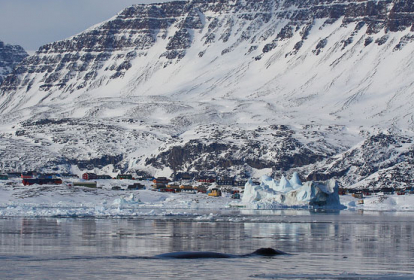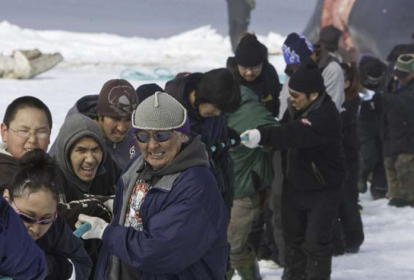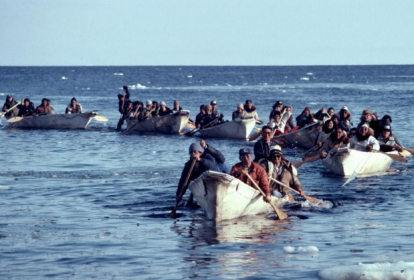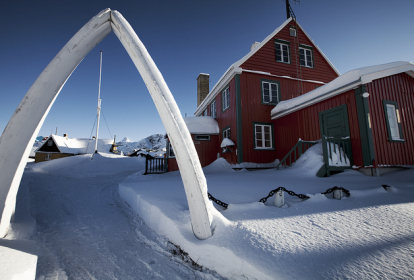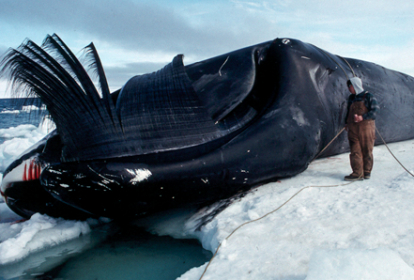In some parts of the world, whale products play an important role in the nutritional and cultural life of native peoples. Four IWC member countries conduct aboriginal subsistence hunts today: Denmark (Greenland), Russia (Chukotka), St Vincent and the Grenadines (Bequia) and the United States (Alaska and also potentially a resumption of hunts previously undertaken by the Makah Tribe of Washington State).
From the outset, the IWC recognised that indigenous or aboriginal subsistence whaling is not the same as commercial whaling. Aboriginal whaling does not seek to maximise catches or profit. It is categorised differently by the IWC and is not subject to the moratorium. The IWC recognises that its regulations have the potential to impact significantly on traditional cultures, and great care must be taken in discharging this responsibility.
In summary, the IWC objectives for management of aboriginal subsistence whaling are to ensure that hunted whale populations are maintained at (or brought back to) healthy levels, and to enable native people to hunt whales at levels that are appropriate to cultural and nutritional requirements in the long term.
|
Click here to read more about IWC objectives for management of aboriginal subsistence whaling |
ASW catch limits are set in multiple-year blocks. The current block was established in 2018 and catch limits will next be considered in 2024. To support this process the Commission receives information from two sources:
- the Scientific Committee provide advice on the sustainability of proposed hunts and safe catch limits.
At its meeting in 2022, the Commission acknowledged the importance and priority that should be given to the scientific work programmes that support ASW. The Commission also acknowledged the value of traditional knowledge, acquired by indigenous communities over centuries. The Commission supported efforts by the Scientific Committee to incorporate this knowledge into its pioneering programme of assessment and review.
Read more about scientific advice on ASW.
- the four national governments provide information on the needs of their indigenous people.
This information is publicly available online in Descriptions of the Hunts which summarise the relevant cultural, subsistence and nutritional information about each hunt, products and distribution.
Read the Descriptions of the Hunts.
At its meeting in 2022, the Commission also endorsed the next steps in a new initiative to conduct an IWC Aboriginal Subsistence Whaling Survey of Indigenous and Human Rights Instruments. This survey was part of a package of measures endorsed in 2018, aiming to inform and assist the Commission in its role as regulator of indigenous whaling (see below).
The ASW Working Group and a new approach
In 2018, the Commission endorsed proposals made by a working group established six-years earlier to consider some long-standing and complex questions, and improve the way that the Commission considered ASW. A number of new initiatives were endorsed in order to facilitate a more straight-forward process when catch limits are next considered at the 2024 meeting of the Commission. The new initiatives include:
- a new timetable for sharing information from the hunts, and receiving feedback, maximising discussion time and transparency;
- agreement that status quo catch limits would be renewed automatically, assuming a series of agreed steps continue to be completed;
- a commitment to establish closer ties with international and inter-governmental organisations focusing on indigenous rights.
|
Click here to read more about the Aboriginal Subsistence Whaling Working Group |
ASW Voluntary Fund
The Voluntary Fund for Aboriginal Subsistence Whaling (ASW) was established by the Commission at its meeting in 2012. The aim of the fund is to assist subsistence hunts in achieving compliance with IWC measures. These measures span a range of issues including hunter safety, reporting processes and weapons improvement programmes which reduce animal suffering and increase efficiency during these hunts.
Read more about the ASW Voluntary Fund.

